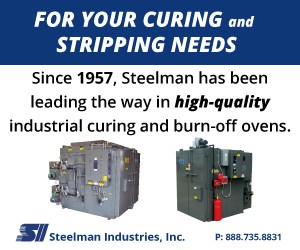Powder Coating Aluminum Alloy
Question: Since you dealt with a toaster oven pan question so well in a past issue, here is another question from a consumer, but one that may have some general interest among your industrial customers as well: I am considering using powder coat to provide a durable black coating on some motorcycle parts, including the main aluminum engine and transmission cases. (They will run quite hot to the touch in actual service.) But at least one manufacturer of these aluminum cases (not the kind I have) strongly recommends against powder coating their cases because the heat involved in the powder coating process can damage these aluminum alloy parts.
Question:
Since you dealt with a toaster oven pan question so well in a past issue, here is another question from a consumer, but one that may have some general interest among your industrial customers as well:
I am considering using powder coat to provide a durable black coating on some motorcycle parts, including the main aluminum engine and transmission cases. (They will run quite hot to the touch in actual service.) But at least one manufacturer of these aluminum cases (not the kind I have) strongly recommends against powder coating their cases because the heat involved in the powder coating process can damage these aluminum alloy parts. Is the heat used in the properly regulated curing process sufficient to make this a cause for concern with aluminum parts in general, or is this manufacturer just “covering themselves” against the case where someone uses grossly excessive heat in the curing process? K. G.
Answer:
Some aluminum alloys are tempered to provide specific mechanical properties, sometimes at reduced metal thickness and weight. These aluminum alloys have a temper designation like “T-6” after the alloy (i.e. 6061 T-6). This temper can be affected, softened, under certain heat conditions. Some powder coating ovens running above 400°F have been known to reduce the temper on such aluminum alloys. Considering that the motor supplier cannot predict the cure temperature used by the powder coater, they advise against powder coating their products.
I would accept their recommendations on face value and not try to powder coat these parts. To get acceptable powder coating life would require you to use high-temperature powder coatings (silicone-based materials). These materials do not have the same durability as “standard” powder coatings (i.e. they can be softer). Besides the heat dissipation of the cylinder head can be reduced if the powder coating is applied too thick, a common problem.
My advice would be to not powder coat the aluminum parts, choose a different air-dried liquid coating, or go for a different, non-aluminum, type motor and powder coat it. The choice is yours.
Related Content
-
Heat Up Your Maintenance Plan for Best Oven Performance
Improve efficiency and profitability with a preventive maintenance program for your industrial heating equipment.
-
Curing Oven Basics
Simply heating up the substrate does not cure the coating. There are many variables to consider when choosing the best cure oven for your application...
-
The Lowdown on Infrared Curing
In this Q&A, infrared curing’s ins and outs are covered by Carlisle Fluid Technologies, including how it works, why its a popular curing type and the benefits of it.















